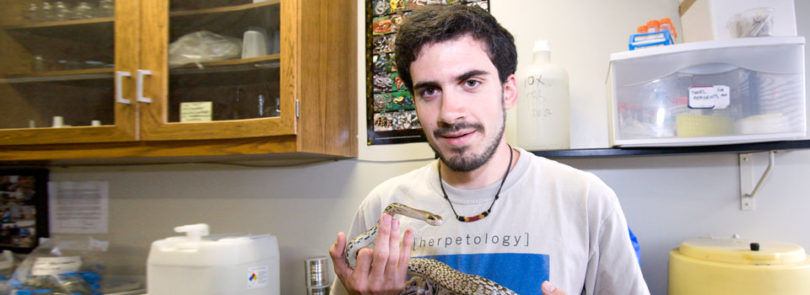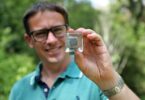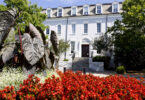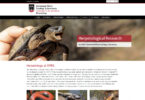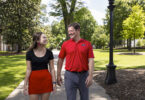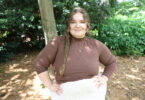If you want to know about slithering or slimy creatures, call senior ecology student Andrew Durso. He has helped teach classes in herpetology, population ecology and ichthyology in UGA’s Eugene Odum School of Ecology, which is the first and only stand-alone school of ecology in the world. Additionally, he has conducted research including the first population ecology study of diamondback terrapins in Georgia and data collection for a field guide to reptiles and amphibians in Ecuador. He has done award-winning detection probability research for aquatic salamanders and aquatic snakes, conducted in part at UGA’s Savannah River Ecology Laboratory near Aiken, S.C. He is the student representative on the Odum School of Ecology’s Undergraduate Curriculum Committee and a former officer of the Herpetological Society at UGA. Durso works part-time at the Reference Desk in the Science Library. After graduation, he plans to attend graduate school and eventually work in the area of conservation policy development or environmental education or both.
Hometown:
Raleigh, N.C.
High School:
William G. Enloe High School
Degree objective:
B.S. in ecology
Expected graduation:
May 2009
University highlights, achievements, awards and scholarships:
I was the undergraduate teaching assistant for Herpetology in Spring of 2007 and 2008, for Population Ecology in Fall 2008 and Ichthyology in Spring 2009. I love teaching, so these have been fantastic experiences for me. Last summer, I was a field assistant on the first ever population ecology study of diamondback terrapins in Georgia. I also traveled to Monteverde, Costa Rica, where I was a National Issues Forum moderator on the subject of water resources. I am the undergraduate representative on the Odum School of Ecology’s Undergraduate Curriculum Committee, where I help the school by giving an undergraduate’s perspective on courses and advising. I was president of the University of Georgia Herpetological Society during the 2006-2007 term, and vice president of outreach the year prior. I now serve the Society in an advisory capacity. In 2007, I won a Courts International Scholarship with which I traveled to Ecuador to help collect data for a field guide to reptiles and amphibians of that country. For that work, I won Best Undergraduate Poster in the Odum School of Ecology’s 2008 Graduate Student Symposium. I was a CURO Apprentice for two years, where I did research with Dr. John Maerz on the detection probability of aquatic salamanders, work which I supported with the 2006 Joshua Laerm Academic Support Award from the Georgia Museum of Natural History as well as the 2007 University of Georgia Libraries Undergraduate Research Award. During the summer of 2006, I investigated a similar question about aquatic snakes in the Carolina Bays at the Savannah River Ecology Lab. For this project, I had a National Science Foundation Research Experience for Undergraduates grant. This work won me the Best Undergraduate Poster award at the 2006 Academy of the Environment Symposium, and fulfilled my lifelong wish to work at SREL.
Current Employment:
I work in the reference department at the UGA Science Library. I help patrons to search for books, journals and government documents in our extensive print collection and online. I also help them access databases and use citation software such as EndNote. I particularly enjoy this job in the spring, when students from Dr. Castleberry’s Vertebrate Natural History class come in for help with their term papers. It’s very satisfying to help someone research a topic in which I’m already well-versed.
I chose to attend UGA because…
I first heard of UGA when several colleagues from my job at the North Carolina State Museum of Natural Sciences recommended Odum School of Ecology because of its ties to the Savannah River Ecology Lab. Fortunately, I had the opportunity to do research there in my first summer after my freshman year. Additionally, the flexibility of the major and the quality of the advising was apparent to me before I chose to come here. I also love the Athens community and the music scene.
My favorite things to do on campus are…
…relaxing in the Ecology courtyard or by the pond out front, especially on Tuesday and Thursday afternoons when the ad hoc string musicians are playing. Riding my bike down the big hill from North Campus is always fun, though trucking it up there from Baldwin St. is probably one of my least favorite things!
When I have free time, I like…
…to go hiking, herping (looking for reptiles and amphibians), birdwatching, camping, backpacking, canoeing, cycling and anything outside. I live by Memorial Park, so visiting the zoo at Bear Hollow is a relaxing way to pass an afternoon. I love reading. I also enjoy photography (mostly of reptiles and amphibians) and SCUBA diving. Indoors, I like going to concerts, especially if I can see my friends’ bands or other local musicians.
The craziest thing I’ve done is…
…pose as Mr. November for the 2009 “Sustainability is Sexy” nude calendar. The calendar highlights 12 months of easily-reproducible habits to reduce your environmental impact. It’s not hippie propaganda or an environmental special interest though! It’s an issue that should be a concern for everyone. Proceeds support educational projects and sustainability initiatives on campus.
My favorite place to study is…
…outside! I do like studying in the science library because of the quiet and because I get paid! When I was on the meal plan, I used to study in O-House, before it was remodeled, because of the few distractions.
My favorite professor is…
It’s hard to choose just one, so I won’t. I’ve taken multiple classes from John Maerz and Bob Cooper of the Warnell School of Forestry and Natural Resources. Maybe I’m a sucker for corny jokes, which both these guys incorporate in plenty, or maybe it’s just the tight, entertaining, frank lecturing style, the focus on applied uses for their material, and the abundant field components that make classes taught by these two so enjoyable. Their friendship and assistance outside of the classroom with my research and my life have also been invaluable.
If I could share an afternoon with anyone, I would love to share it with…
…Edward O. Wilson. Although great historical thinkers such as Darwin or Wallace would be tempting, Wilson has written extensively and addressed the many ecological and social problems that currently face and will continue to face the human species. I have learned a great deal from his writings and would be honored to spend an afternoon sharing my own ideas and growing them from his input and advice.
If I knew I could not fail, I would…
…convince every person on Earth, particularly leaders of industry and political systems, of the intrinsic value of ecosystems and biodiversity. In addition to the annual estimated $33 trillion worth of irreplaceable services (i.e., pollination, flood control, water purification) provided by global ecosystems—which is much greater than the combined GNP of every country—humans are not on this planet to take advantage of or eliminate other species. To do so is to guarantee our own extinction.
After graduation, I plan to…
…get my M.S. in Biological Sciences at Eastern Illinois University with Dr. Stephen J. Mullin. Afterwards, I may pursue a Ph.D. in a related field or begin work for a conservation organization to develop better conservation policy and environmental education. Ultimately, I envision myself having several careers in research, education, outreach, sustainability, policy-making and consultation, as well as having a family.
The one UGA experience I will always remember will be…
…recycling at the 2008 Alabama football game. We worked for 16 hours (until 1:30 a.m.) to collect, sort and drain 1.6 tons of bottles and cans, which barely made a dent in the more than 75 tons littered on campus that day. The state of the campus after home football games is disgusting and needs to be addressed. I helped lead this effort, along with some of my closest friends, to help with the revolting job of sorting through the offal that some people think it’s OK to place inside recycling bins.


